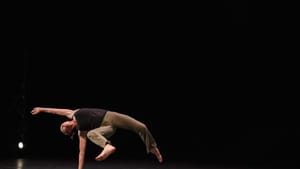Stay in the Loop
BSR publishes on a weekly schedule, with an email newsletter every Wednesday and Thursday morning. There’s no paywall, and subscribing is always free.
A truthful partnership of hip-hop and modern dance
Philly Fringe 2025: Rennie Harris presents Beautiful Human Lies: Chapter 4

If all art is a kind of confession, as James Baldwin once stated, what does it mean for artists—especially artists from different backgrounds—to work together? And what can an audience gain by sitting in the dark for an hour or two to witness their work? Such big questions make a compelling context for the full-length dance solo Beautiful Human Lies: Chapter 4, choreographed by street dance pioneer and North Philly native Rennie Harris for modern dancer Megan Bridge, who hails from a privileged Philly suburb.
Watching the work’s premiere on Saturday as part of the Curated Philadelphia Fringe Festival, I found that context more captivating than the work itself. For thoughtful audiences, however, Beautiful Human Lies is well worth seeing.
These two artists first worked together in 1999, when Bridge, then 19, asked Harris, a rising choreographer, to create a dance for her capstone project at SUNY Purchase. This was Chapter 2 of Harris’s Human Lies series, which expresses the personal struggles of various performers Harris has worked with.
Chapter 4, he remarked in a pre-show talk with dance scholar Brenda Dixon Gottschild, is heavily influenced by his own early, highly dramatic solo Endangered Species—and that connection comes to life immediately as Bridge walks a jagged path, popping and locking as if trauma had electrically charged her body. She hovers close to the floor, propelling herself ruggedly with her hands; she grabs her crotch as her face contorts in a silent scream. Bridge, a highly talented dancer, fearlessly meets one of Harris’s main challenges: to look ugly onstage. Harris, now internationally renowned, isn’t afraid to return to these very raw roots—and demonstrates he can do so through the lens of another dancer’s experience.
At other times, Bridge’s arms move in dancerly arcs, framing and protecting her. Her legs extend and swing back to center in smooth, complex turns; the balls of her feet beat out a quick, balletic bourée that sweeps her away to a new part of the stage. Harris ably employs a mixed vocabulary to evoke Bridge’s sometimes rocky, sometimes smooth path to self-knowledge in her 40s.
Periodically, the electronic score by Peter Price and sound designer/engineer Darrin Ross goes silent: there’s a Q&A with Harris and Bridge (they talked a lot, Harris says). Bridge delivers a couple of first-person narratives, punctuated by projections upstage that highlight the contrast between Harris and her: “White Suburbia,” shouts one. “What is the relationship between hip-hop and social change?” probes another. That question is never answered explicitly, but the existence of Beautiful Human Lies: Chapter 4, as it reaches across the boundaries of race, privilege, and gender, is an answer in itself.
The remaining Monday, September 8, performance at 7pm is sold out, but according to organizers, staff may be able to fit more in at their discretion onsite.
What, When, Where
Beautiful Human Lies: Chapter 4. Choreographed and directed by Rennie Harris, performed by Megan Bridge. $35 ($15 for students, industry, and those under age 25). Through September 8, 2025, at the Proscenium at the Drake, 302 S Hicks St, Philadelphia. (215) 413-1318 or phillyfringe.org.
Accessibility
The Proscenium at the Drake is a wheelchair-accessible venue with gender-neutral restrooms.
Sign up for our newsletter
All of the week's new articles, all in one place. Sign up for the free weekly BSR newsletters, and don't miss a conversation.

 Eileen B. Fisher
Eileen B. Fisher